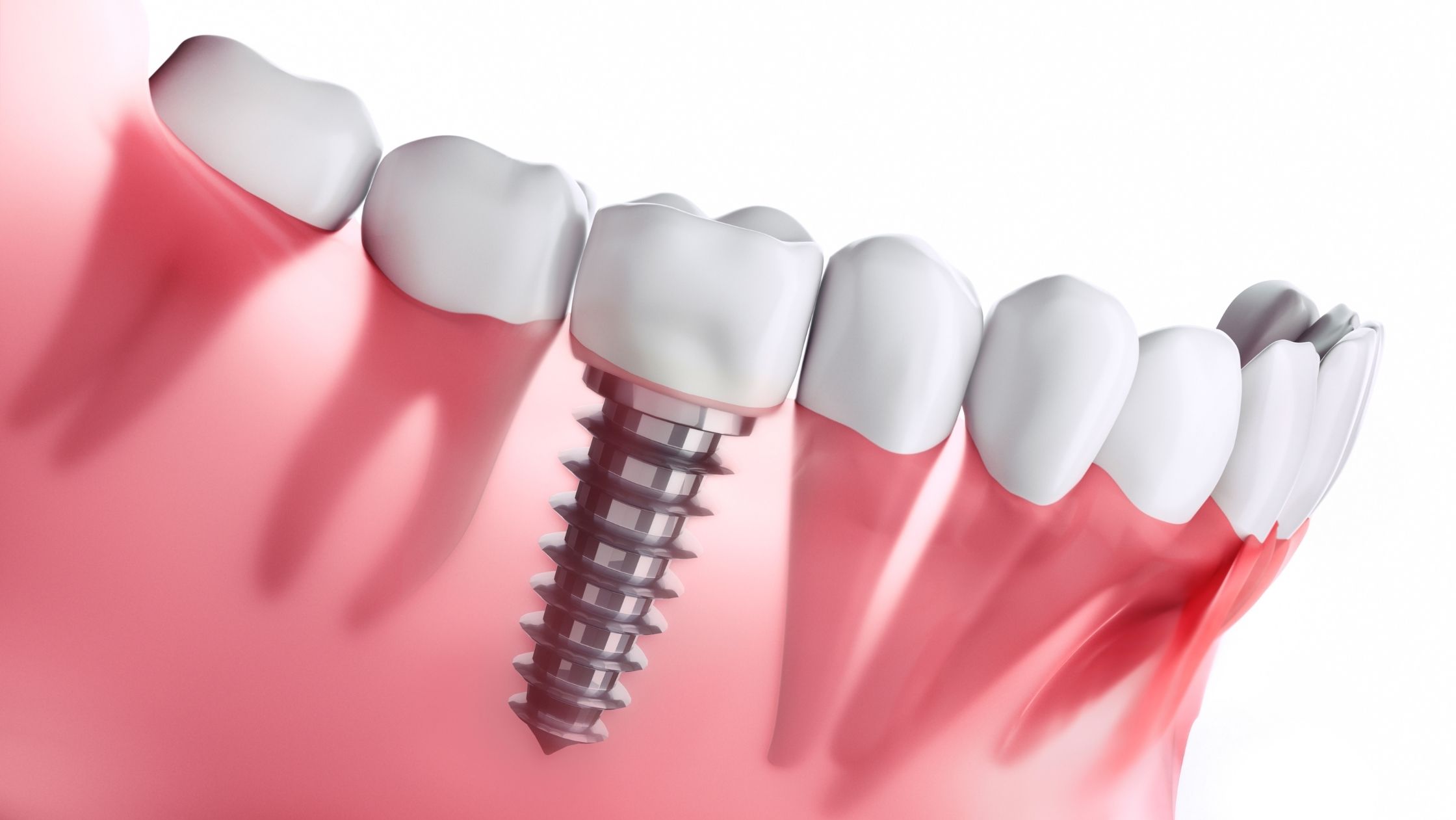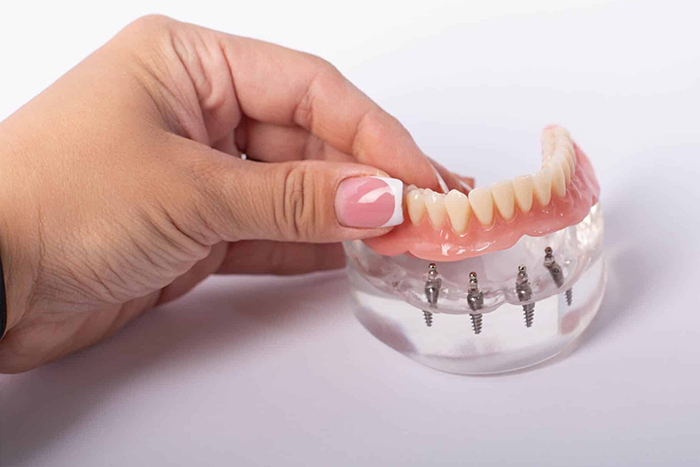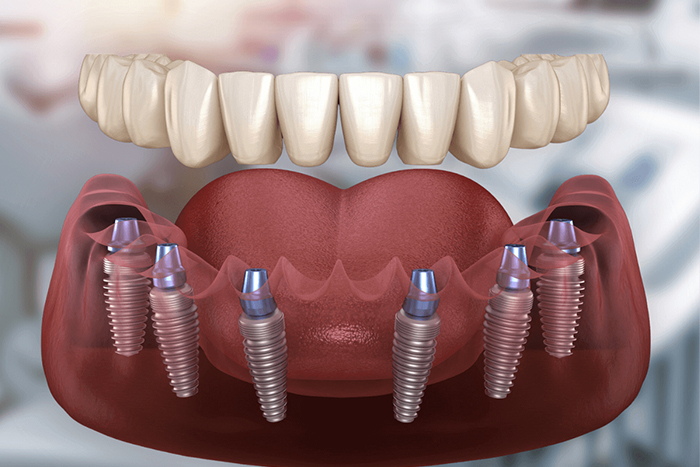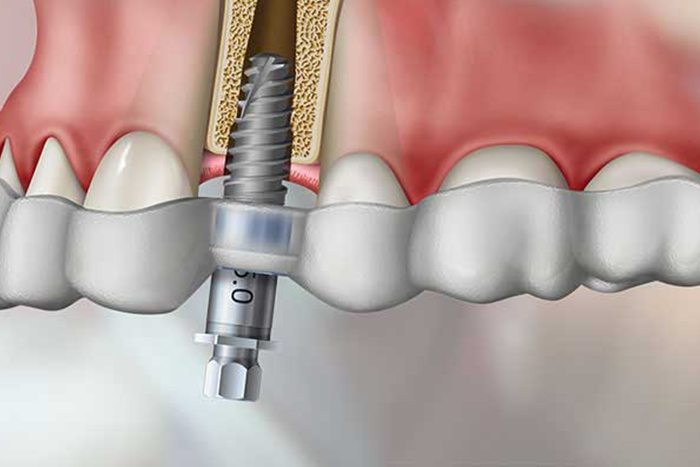Dental Implants
Dental Implants In Kolkata
Functional & Aesthetic restoration of your teeth
Dental implants serve as artificial replacements for missing or damaged teeth, comprising a biocompatible screw-like post and a dental crown. This post is surgically inserted into the jawbone, upon which the crown is mounted to emulate the appearance of a natural tooth. Renowned for their effectiveness, durability, and ability to promote oral health, dental implants are a widely chosen restorative option.

Implants that look like natural teeth
Benefits of dental implants
- Prevents tooth decay and cavities
- Prevent bone loss and gum erosion
- Long-lasting Results
- Prevent facial sagging and premature aging
- Better alternatives to dentures
- It helps to restore speech functions
- It aesthetically enhances your appearance
Dental restoration for a Lifetime
Why do we need dental implants?
- Accumulation of complicated and painful dental procedures like snus lift or bone graft
- Since other teeth will shift to the gap, it is likely to caused crooked teeth
- The misalignment of teeth can also cause bite issues
- This can also lead to TMJ disorders, which may cause chronic jaw pain
Implants that look like natural teeth
Types Of Dental Veneers

Same-day Dental Implants

All-on-4 Dental Implants

All-on-6 Dental Implants

3D Guided Implant Surgery


Why choose us
- 99% Success rate
- Highest quality Implants
- Same-Day Implants
- International certified Implantologists
- 6400+ Implants Placed
Losing a permanent tooth can significantly impact your confidence and willingness to smile. Moreover, the gap left by the missing tooth can lead to a series of dental issues, including the shifting of adjacent teeth, increased risk of infections, susceptibility to gum diseases, and other oral health complications.

Implants that look like natural teeth
Dental Implants : Before & After










Dental Implants vs Dentures
Versatility
Placement
Function
Comfort
After Care
FAQs
The expense associated with dental implants is not uniform and can differ significantly from one individual to another. This variability is influenced by the specific needs of each patient, including the number of dental implants required for their unique case.
Indeed, the minimum age for receiving dental implants is typically 18 years; however, the critical factor is whether the patient's jaw has fully developed. It's possible that even at 18, a patient's jaw might still be maturing, which means it could continue to grow and change, potentially affecting the timing and suitability of dental implant placement.
Dental implant surgery is commonly performed under local anesthesia, ensuring that patients experience no pain throughout the procedure. Often referred to as "keyhole surgery" due to its minimally invasive nature, this technique minimizes discomfort. After the procedure, as the anesthesia diminishes, patients might encounter some mild pain or discomfort. However, this is typically manageable with over-the-counter pain medication and should subside after a brief period.
Absolutely, there's a high chance that your dental concerns can be addressed effectively. It's crucial to consult a dentist promptly to explore your options. Prior to any surgical intervention, a comprehensive 3D scan of your jawbone can be performed. This advanced imaging technique allows for a virtual simulation of the implant procedure, enabling your dental team to meticulously plan the best approach tailored to your unique situation. Ensuring a personalized solution is key to achieving the best outcome for your dental health.
Our team of highly skilled Implantologists, Oral and Maxillofacial Surgeons, and Prosthodontists bring their specialized expertise to guarantee a safe and comfortable experience during your dental implant treatment.
Dental implants offer several advantages over dental bridges, including:
- Durability: Implants tend to last longer than dental bridges, providing a more permanent solution.
- Aesthetic Longevity: They maintain a natural-looking appearance for a longer period compared to bridges.
- Bone Health: Implants help prevent bone loss, whereas bridges can lead to bone deterioration over time.
- Teeth Protection: Implants do not affect surrounding teeth, preserving natural tooth structure, while bridges may require alteration of adjacent teeth for support.
- Maintenance: Caring for implants is relatively straightforward and similar to caring for natural teeth, making them easier to manage than dental bridges.
Dental implants serve as an excellent choice for filling the gaps left by missing teeth. Although instances of failure are uncommon, they can occur if there's a loss of bone density surrounding the implant's base, often due to illness. Additionally, inadequate oral hygiene might lead to an infection at the site of the implant, potentially causing the implant's crown to become loose at the gum line. This loosening can create a breeding ground for bacteria, possibly resulting in further bone loss. To avert such complications, maintaining diligent dental care practices and scheduling regular visits to the dentist are crucial steps.
Dental implants offer a lasting solution for achieving an excellent smile. Yet, their enduring success hinges on the quality and quantity of bone available, as well as the maintenance of good oral hygiene. To safeguard the longevity of your implants, wearing a nightguard is advised for individuals who grind their teeth. It's also important to refrain from chewing ice and to exercise caution during contact sports to prevent potential damage to the implants.
Indeed, age is not inherently a barrier to receiving dental implants. The critical requirements for this procedure include having a healthy jawbone and having reached skeletal maturity. Our implantologists will conduct a thorough assessment to decide if you are an appropriate candidate for dental implants.
Dental implants are constructed from titanium, a synthetic material immune to cavities, distinguishing them from natural teeth in this aspect. Despite their resistance to decay, maintaining oral health and cleanliness around the implant site is crucial, mirroring the care given to natural teeth. Routine dental check-ups are essential for preventing infections that could escalate into gum disease, underscoring the importance of regular professional oversight for the health of both the implants and the surrounding oral tissues.



